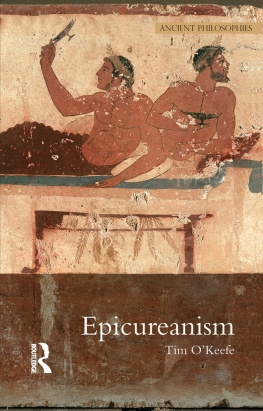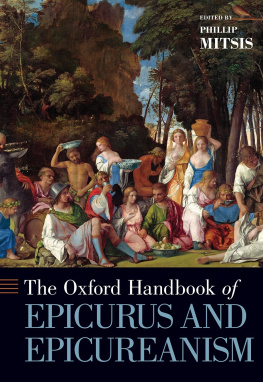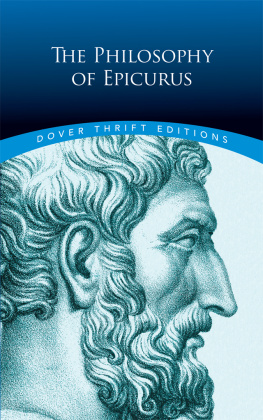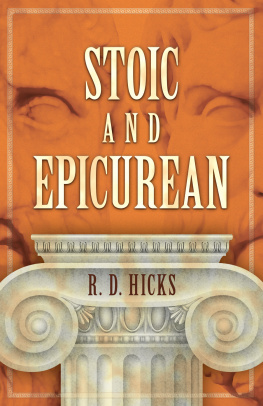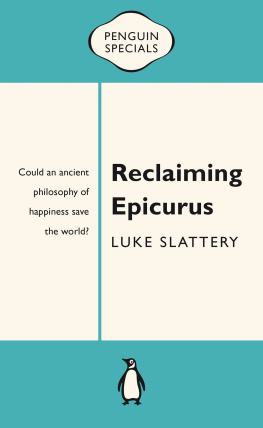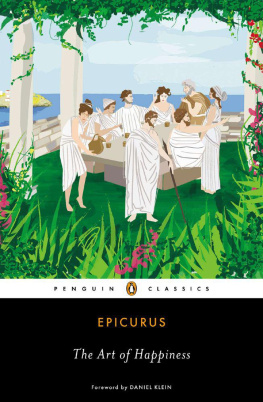Epicureanism
Ancient Philosophies
This series provides fresh and engaging new introductions to the major schools of philosophy of antiquity. Designed for students of philosophy and classics, the books offer clear and rigorous presentation of core ideas and lay the foundation for a thorough understanding of their subjects. Primary texts are handled in translation and the readers are provided with useful glossaries, chronologies and guides to the primary source material.
Published
The Ancient Commentators on Plato and Aristotle
Miira Tuominen
Ancient Scepticism
Harald Thorsrud
Cynics
William Desmond
Epicureanism
Tim OKeefe
Neoplatonism
Pauliina Remes
Presocratics
James Warren
Stoicism
John Sellars
Forthcoming
Classical Islamic Philosophy
Deborah Black
Confucianism
Paul Goldin
Indian Buddhist Philosophy
Amber Carpenter
Plato
Andrew Mason
Socrates
Mark McPherran
Epicureanism
Tim OKeefe

For Mom and Dad
First published in 2010 by Acumen
Published 2014 by Routledge
2 Park Square, Milton Park, Abingdon, Oxon OX14 4RN
711 Third Avenue, New York, NY 10017, USA
Routledge is an imprint of the Taylor & Francis Group, an informa business
Tim OKeefe, 2010
This book is copyright under the Berne Convention. No reproduction without permission.
All rights reserved. No part of this book may be reprinted or reproduced or utilised in any form or by any electronic, mechanical, or other means, now known or hereafter invented, including photocopying and recording, or in any information storage or retrieval system, without permission in writing from the publishers.
Notices
Practitioners and researchers must always rely on their own experience And knowledge in evaluating and using any information, methods, compounds, or experiments described herein. In using such information or methods they should be mindful of their own safety and the safety of others, including parties for whom they have a professional responsibility.
To the fullest extent of the law, neither the Publisher nor the authors, contributors, or editors, assume any liability for any injury and/or damage to persons or property as a matter of products liability, negligence or otherwise, or from any use or operation of any methods, products, instructions, or ideas contained in the material herein.
ISBN: 978-1-84465-169-6 (hardcover)
ISBN: 978-1-84465-170-2 (paperback)
British Library Cataloguing-in-Publication Data A catalogue record for this book is available from the British Library.
Typeset in Minion.
Contents
Why to read this book
Epicurus thought had a significant impact on the world: along with Stoicism and Academic Scepticism, Epicureanism was one of the major philosophical systems competing for the allegiance of thoughtful people in the Hellenistic world; Epicurean communities flourished for hundreds of years after Epicurus death; and the rediscovery of Epicurus philosophy helped shape the scientific revolution. Also, and in my view more importantly, Epicurus was a first-rate philosopher. He provides a systematic account of the nature of the world and our place in it, how we can come to know the world, and how we can attain happiness. Along the way he lays out arguments on a whole host of subsidiary topics, such as the nature of the mind and its relationship to the body, the untenability of scepticism, the development of society, the role friendship plays in attaining happiness, and the afterlife (or lack thereof). In my own experience, grappling with what Epicurus has to say about something has always helped sharpen and deepen my own thinking on that subject, even where I ended up concluding that he was deeply mistaken. Epicurus himself would claim that we should study him simply to attain happiness. According to Epicurus, a proper understanding of the workings of the world and the natural limits of ourdesire will free us from superstitious fears and allow us to attain an untroubled, blessed life.
But Epicurus own writings are mostly lost to us, and what is left consists largely of summaries of his positions and short sayings, often written in a dense and jargon-laden style. The extended expositions of Epicurus philosophy by Lucretius and Cicero are more informative and approachable, but even these can be deeply puzzling if used as starting-points for understanding Epicurus, since Lucretius and Cicero did not aim their writings at an audience of twenty-first-century English speakers. I hope that this book serves as a useful introduction to Epicurus positions and the arguments he gives in favour of them.
How to use this book
This book is intended as a stand-alone introduction. I do not include extended quotations from ancient sources; instead, I usually summarize matters in my own words. However, I encourage interested readers to go back to the ancient texts themselves. I gather together a list of ancient readings on Epicureanism for each chapter at the end of the book. Some readers (or teachers) may wish to pair this book with a compendium of ancient texts. For these readers, I also include references to the two best compendia of texts on Epicureanism in English translation: the second edition of Hellenistic Philosophy: Introductory Readings, by Brad Inwood and Lloyd Gerson (1997) and The Hellenistic Philosophers, by A. A. Long and D. N. Sedley (1987). Many of the ancient texts I refer to are also in these compendia; where this is so, I indicate this using the following conventions: (IG ) for Inwood and Gerson, (LS ) for Long and Sedley.lists of ancient sources within the Further Reading. These lists of ancient sources include only those pertaining directly to Epicureanism; I have not collated the references to passages of, for example, Aristotle and Plato that I refer to along the way to help illuminate Epicureanism.
Lucretius is our best source for Epicurus metaphysics and physics, as well as being a wonderful poet. Both LS and IG include some selections from Lucretius (LS much more extensively than IG). However, they (understandably) leave much out, given the length of Lucretius poem, so some people may find it useful to read this book along with Lucretius too. Fortunately, a large number of good and reasonably priced translations of Lucretius are available. Three in particular I recommend: Martin Ferguson Smiths translation On the Nature of Things (2001) is accurate and readable, and includes useful notes. For those who want to read Lucretius poetry as poetry, not prose, Rolfe Humphries vigorous translation The Way Things Are (1968) is outstanding, albeit fairly free in its rendering of Lucretius, while A. E. Stallingss recent translation The Nature of Things (2007) is also quite good and closer to the text and tone of Lucretius. Many of Ciceros treatises are our best sources of information for key parts of Epicureanism. This is particularly true of his De Finibus Bonorum et Malorum (On ends), which reports Epicurus ethics in book one and criticizes it in book two. Raphael Woolf gives a fine translation, accompanied by Julia Annass (2001) extensive introduction.
I avoid extensive wrangling in scholarly controversy of the sort that is better done in journal articles, since doing so would quickly derail this book from its purpose. Instead, I just put forward what I myself take Epicurus views to be, backed up by references to the texts, although I do sometimes indicate where what I say is controversial. Since my interpretations of Epicurus are not especially idiosyncratic, I do not think that the reader will be badly misled by this approach. However, the reader should be aware that many aspects of Epicurus thought are controverted. I include Further Reading at the end of the book for readers who wish to explore scholarly issues further. Volume 2 of LS includes an excellent (if now dated) annotated bibliography, organized topically. And
Next page
